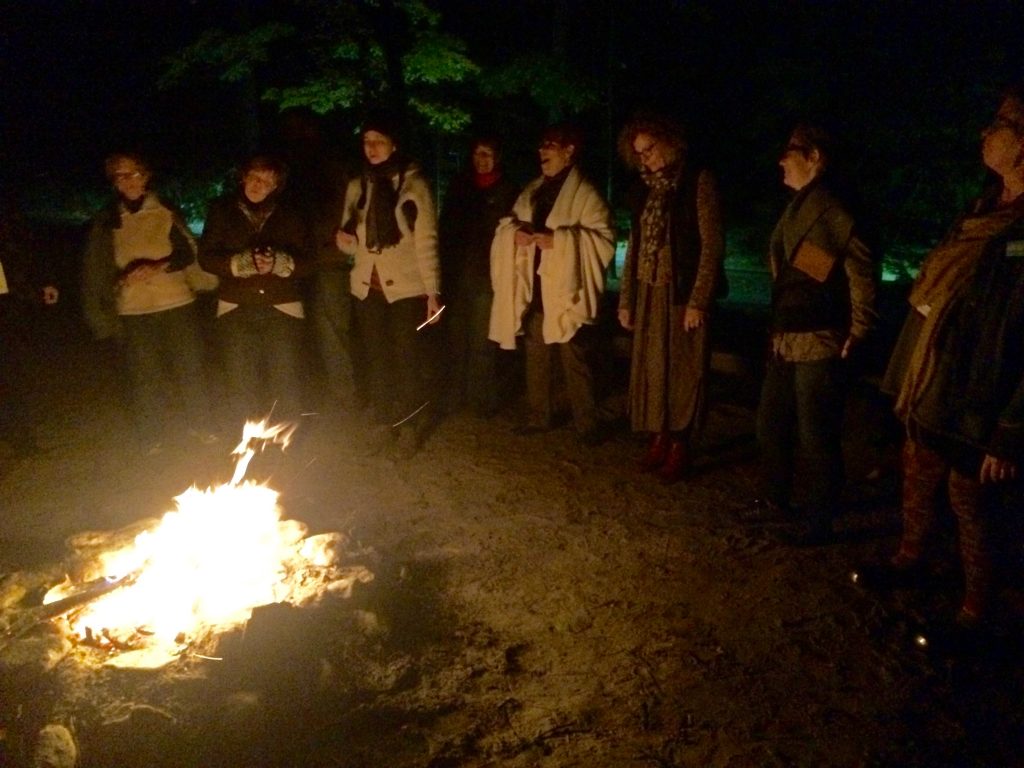
by Cara Modisett
Last October, I flew to New Hampshire with two friends – one a retired priest and the other a religion professor (and priest’s spouse). The retired priest had told us about this program, Music that Makes Community, a nonprofit that holds workshops teaching paperless music, and teaching how to teach paperless music, a term I had not heard before. For us, it sounded like a way to bring more life and communion through music to the small congregation of St. Elizabeth’s Episcopal, where I have been music director for a number of years.
It was my first time at the Barbara C. Harris Camp and Conference Center, a ministry of the Episcopal Diocese of Massachusetts (even though it’s located in New Hampshire). Fall is not overrated in New England – the trees were glorious, and I spent time sitting on the shore of Otter Lake while there, watching the water and the sun through brilliant orange leaves.
We made friends there among the folks who gathered from at least six or seven denominations, by my non-comprehensive count (including Methodist, Presbyterian, Lutheran, Congregational, Episcopal, former Mennonite and Baptist). At least seven were clergy, five of those women. Not all of us were singers (I, for one, am not). During the course of three days, we learned songs, taught each other songs, even wrote songs, and explored in workshops and in dinner table conversations ways that paperless music could be incorporated into worship, liturgy, prayer, community gatherings, protests, memorials – sacred and secular, cross-denominational, cross-generational.
The idea of “paperless music” – and I rather like the term “paperless singing” – is just that: we teach, and sing, without paper. The music itself can, and did, come from many traditions – throughout the workshop, we sang everything from Presbyterian and Mennonite hymns to spirituals to Taize chants to world music to summer camp songs to music composed by our teachers. (MMC has a roster of 26 presenters, and its single- and multiple-day workshops vary as to who is teaching – our teachers were the Reverend Cricket Cooper, a New England Episcopal priest; Marilyn Haskel, recently retired from Trinity Wall Street; Jorge Lockwood of The United Methodist Church and Union Theological Seminary; and executive director Paul Vasile, a New York-based composer and pianist.) We learned to teach in ways that are rather traditional – by ear, by hand gesture – trying out techniques that reminded us of “lining out” hymns, reminded me of old-time music jams in the mountains.
From a liturgy and worship perspective, we are cognizant that while music reading was part of many people’s education growing up for many years, it is no longer. On Sunday mornings, we either bury our eyes in our hymnals and sing, each an island unto ourselves, or those of us who can’t read music, who aren’t familiar with the tunes, or who don’t feel confident singing, just don’t.
But we also talked about where paperless singing can create connections outside the church’s walls – on college campuses, in Black Lives Matter protests, when communities come together to grieve or to work through differences. Since we’ve come home, the three of us have started creating a group of interested singers to gather once a month or so for potluck and singing. At our first “practice group” evening, one of our group taught a bit of blues.
On the last night, we sang around a campfire – just like summers growing up – with marshmallows and s’mores. On the following morning, we held a Eucharist that was entirely sung, except a reflection, which I wrote – really, curated, from the words and music I’d been hearing around me for the last few days. MMC published it on its blog the next month, not long after the presidential election, and this month, amidst the whirlwind of debate, fear, frustration and celebration prior to next week’s inauguration, it may resonate again.
Last night, twenty or so human beings and one yellow lab circled a campfire, and it struck me how small an ember we were, glowing deep in the woods, circled in turn by towering trees and, beyond those, by the high, silver constellations, the waxing moon and the sweep of the Milky Way, so distant and incomprehensible, and also so close that it felt like we could almost hear the music of the spheres.
We seemed fragile, this circle unbroken, singing and laughing and roasting marshmallows, and our music moved from the songs of summer childhoods to something deeper. These last days, while we have been sharing these mysterious hours, inviting God and one another into our souls and hearts, the whirlwind of the world has kept circling beyond us, the hurricanes of weather and politics.
While I was thinking this, and during a break in the singing, one of us stepped forward to give thanks for being able to sing in the night when the morning is what we wish for. And in that thanksgiving was the promise that our fire was stronger than it seemed, small as it was within the world.
The entire reflection can be read on the MMC site here.
Image courtesy of Paul Vasile, taken at our campfire.

